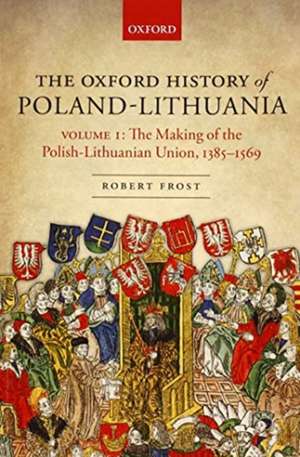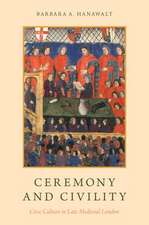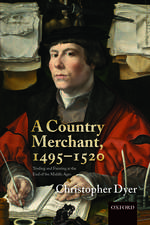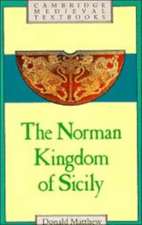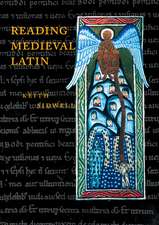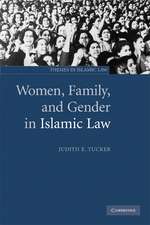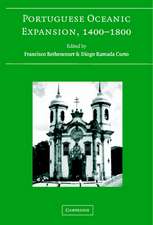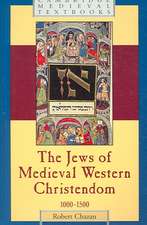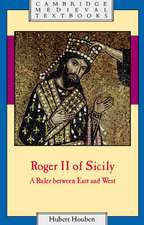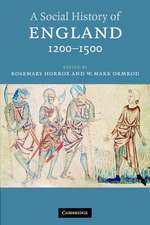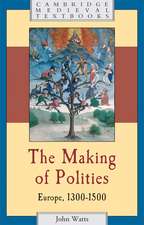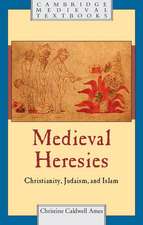The Oxford History of Poland-Lithuania: Volume I: The Making of the Polish-Lithuanian Union, 1385-1569: Oxford History of Early Modern Europe
Autor Robert I. Frosten Limba Engleză Paperback – 26 iul 2018
Preț: 323.70 lei
Preț vechi: 388.02 lei
-17% Nou
Puncte Express: 486
Preț estimativ în valută:
61.94€ • 64.84$ • 51.25£
61.94€ • 64.84$ • 51.25£
Carte disponibilă
Livrare economică 05-11 martie
Preluare comenzi: 021 569.72.76
Specificații
ISBN-13: 9780198800200
ISBN-10: 0198800207
Pagini: 592
Ilustrații: 11 black and white illustrations, 6 maps
Dimensiuni: 155 x 234 x 33 mm
Greutate: 0.93 kg
Editura: OUP OXFORD
Colecția OUP Oxford
Seria Oxford History of Early Modern Europe
Locul publicării:Oxford, United Kingdom
ISBN-10: 0198800207
Pagini: 592
Ilustrații: 11 black and white illustrations, 6 maps
Dimensiuni: 155 x 234 x 33 mm
Greutate: 0.93 kg
Editura: OUP OXFORD
Colecția OUP Oxford
Seria Oxford History of Early Modern Europe
Locul publicării:Oxford, United Kingdom
Recenzii
A huge and complex work which will certainly define the contours of this field for the next generation ... [Frost] has produced a work that will serve as a comprehensive history, but is, in fact, much more than that: a fiercely argued and superbly developed study of what it meant for Poland and Lithuania to join their political fortunes in the late Middle Ages.
Volume one is a splendid achievement in its own right: the bar is now raised for its successor. It remains to note with satisfaction that the writing is measured and assured, and that Oxford University Press has produced the book to its usual high standards.
This volume is an outstanding contribution to the history of east central Europe in the late medieval and the beginnings of the early modern period. Moreover, by his conceptualization of what a 'union' is in the context of political theory, and how the Polish-Lithuanian example fits into this, Frost make a nicely original contribution. Most importantly, his focus on a 'union' rather than a nation enables him to write with a refreshingly balanced and judicious outlook that contrasts sharply with the more passionately presented work by some but not all previous scholars. Finally, the text of this volume is written in a prose that is not just fluid, but often graceful and eloquent.
Robert Frost has written an outstanding book, as good as it is big - a major contribution to the history of the polity linked by the hyphen in its title, and to the history of early modern Europe. The book is a major benchmark in Frost's distinguished output addressing specific aspects of the Polish-Lithuanian Commonwealth's history, situated in the broad context of its contemporary Europe ... Robert Frost's great achievement is to situate the Commonwealth of Lithuania and Poland at the highest level of thematic inquiry, analysis, and expository prose, fully in the company of the best work concerning comparable questions elsewhere in Europe.
[Frost] gives us the opportunity to re-think many concepts of the union and its definition, and to overcome the narrow image created by national historiographies, reviving discussions of the union's assessment at a new level ... [it] arouses creative scientific thought and discussion, and provides a great impulse to search for new sources and continue research on the topic of the union.
Such meticulous attention to the historiography of his subject is one of the great merits of Frost's work, in which he is nothing if not colorful and unflinching in his judgment of the often conflicting, confused, or biased interpretations of earlier historians ... By limiting hid attention in this first volume to just the years from Krevo to Lublin, Frost manages a far more focused, nuanced, and richly detailed treatment of political currents in this crucial formative period than Davies and earlier historians have been able to offer ... Professor Frost's work is poised to be the definitive treatment of Poland-Lithuania within the temporal and topical limitations that he has set for himself.
an attentive, balanced and scholarly account that engages with the many historiographical and political disputes in the discourse on the Polish-Lithuanian union without, however, giving in to the temptation of providing such politicized conclusions.
This volume meticulously traces the history of the PolishLithuanian political relationship step by step, over two centuries. It is the first exhaustive narrative of these events in English ... a useful contribution to debates on the PolishLithuanian union, and it will bring those debates to a much wider audience, offering fresh perspectives for historians in central Europe to mull over ... This book is the fruit of considerable labour ... and will be read with interest across central and northern Europe.
Volume one is a splendid achievement in its own right: the bar is now raised for its successor. It remains to note with satisfaction that the writing is measured and assured, and that Oxford University Press has produced the book to its usual high standards.
This volume is an outstanding contribution to the history of east central Europe in the late medieval and the beginnings of the early modern period. Moreover, by his conceptualization of what a 'union' is in the context of political theory, and how the Polish-Lithuanian example fits into this, Frost make a nicely original contribution. Most importantly, his focus on a 'union' rather than a nation enables him to write with a refreshingly balanced and judicious outlook that contrasts sharply with the more passionately presented work by some but not all previous scholars. Finally, the text of this volume is written in a prose that is not just fluid, but often graceful and eloquent.
Robert Frost has written an outstanding book, as good as it is big - a major contribution to the history of the polity linked by the hyphen in its title, and to the history of early modern Europe. The book is a major benchmark in Frost's distinguished output addressing specific aspects of the Polish-Lithuanian Commonwealth's history, situated in the broad context of its contemporary Europe ... Robert Frost's great achievement is to situate the Commonwealth of Lithuania and Poland at the highest level of thematic inquiry, analysis, and expository prose, fully in the company of the best work concerning comparable questions elsewhere in Europe.
[Frost] gives us the opportunity to re-think many concepts of the union and its definition, and to overcome the narrow image created by national historiographies, reviving discussions of the union's assessment at a new level ... [it] arouses creative scientific thought and discussion, and provides a great impulse to search for new sources and continue research on the topic of the union.
Such meticulous attention to the historiography of his subject is one of the great merits of Frost's work, in which he is nothing if not colorful and unflinching in his judgment of the often conflicting, confused, or biased interpretations of earlier historians ... By limiting hid attention in this first volume to just the years from Krevo to Lublin, Frost manages a far more focused, nuanced, and richly detailed treatment of political currents in this crucial formative period than Davies and earlier historians have been able to offer ... Professor Frost's work is poised to be the definitive treatment of Poland-Lithuania within the temporal and topical limitations that he has set for himself.
an attentive, balanced and scholarly account that engages with the many historiographical and political disputes in the discourse on the Polish-Lithuanian union without, however, giving in to the temptation of providing such politicized conclusions.
This volume meticulously traces the history of the PolishLithuanian political relationship step by step, over two centuries. It is the first exhaustive narrative of these events in English ... a useful contribution to debates on the PolishLithuanian union, and it will bring those debates to a much wider audience, offering fresh perspectives for historians in central Europe to mull over ... This book is the fruit of considerable labour ... and will be read with interest across central and northern Europe.
Notă biografică
Robert Frost was educated at the universities of St Andrews, Cracow, and London. After teaching for eighteen years at King's College London, he moved in 2004 to the University of Aberdeen, where he currently holds the Burnett Fletcher Chair in History. He is interested in the history of eastern and northern Europe from the fourteenth to the nineteenth centuries. His principal research interests are in the history of Poland-Lithuania, and in the history of warfare in the early modern period.
